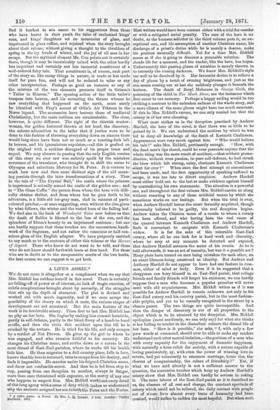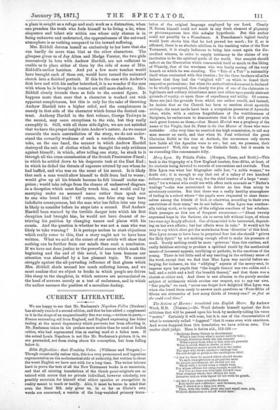A LIFE'S ASSIZE.*
WE do not mean it altogether as a compliment when we say that Mrs. Riddell has outdone herself in this novel. There is certainly no falling-off of power or of interest, no lack of tragic emotion, of subtle complications brought about by necessity, of the struggles that stir up the depth of character. The plot is devised and worked out with much ingenuity, and if we once accept the possibility of the theory on which it rests, the various stages of devolopment are not unnatural. But the main feature of the work is its intolerable misery. From first to last Mrs. Riddell has no pity on her hero. She begins by making him commit homicide, partly in self-defence, partly in the blind flurry of a hand-to-hand scuffle, and then she visits this accident upon him till he is crushed by the torture. He is tried for his life, and only escapes by a verdict of Not Proven. He gives up the girl to whom he was engaged, and who remains faithful to his memory. He changes his Christian name, and settles down as a curate in the most dismal of East-End parishes, where he works till his health fails him. He then migrates to a dull country place, falls in love, knows that his love is returned, tries to escape from his destiny, and finds it impossible. He marries under his feigned Christian name, and dares not confess his secret. And then he is led from step to step, passing from one deception to another, always in danger, more than once threatened with exposure, at the mercy. af 'any one who happens to suspect him. Mrs. Riddell works out every detail of this long agony with a sense of duty which ;hakes us understand why the ancients assigned her sex tobotShe Fates and the Furies.
* A Life's Assize. A Novel. By Mrs. J. 31. Riddell. 8 vols. London: Tinsley Brothers. 1871.
Most writers would have been content either with a trial for murder or with a mitigated social penalty. The case of the hero is no doubt, as the humane solicitor in the third volume puts it, an ex- ceptional one, and his assumption of another Christian name, his discharge of a priest's duties while he is merely a deacon, make his position unusually difficult. Yet for a time Mrs. Riddell seems as if she is going to discover a peaceable solution. The clouds lift for a moment, and the reader, like the hero, has hopes.. Unfortunately this passing gleam of sunshine is merely thrown in, to intensify the coming darkness. We know Mrs. RiddelPs style too well to be deceived by it. Her favourite device is to relieve a day of gloom by a touch of evening brightness, and just as the sun seems coming out at last she suddenly plunges it beneath the horizon. The death of Beryl Molozane in George Geith, the, poisoning of the child in Too Much Alone, are the instances which first occur to our memory. Perhaps a happy ending would be too striking a contrast to the unbroken sadness of the whole story, and a mere climax of the same gloom might have too much sameness. If this be Mrs. Riddell's excuse, we can only remind her that the misery is of her own choosing.
What most strikes us in the deception practised by Andrew' Hardell, the hero of the novel, is that there was so little to be gained by in We can understand the motives by which he was led to deny all knowledge of the death of Kenneth Challerson. Appearances were very much against him. "Who would believe his tale 2" asks Mrs. Riddell, pertinently enough. "How, with the dead man's lips closed, could he ever persuade anyone that the whole thing was the mere result of accident,—that without preme- ditation, without even passion, in pure self-defence, he had struck the blow which left strong, noisy, obstinate Kenneth Challerson - silent for ever ?" When once the first attempt at concealment had been made, and the first opportunity of speaking suffered to escape, it was too late to divert suspicion. Andrew Hardell must either hold out to the last or make evidence against himself by contradicting his own statements. The situation is a powerful one, and throughout the first volume Mrs. Riddell carries us along without resorting to any of those artificial means by which she sometimes works on our feelings. But when the trial is over,. when Andrew Harden leaves the court formally acquitted, though universally believed to be guilty, the real deception begins.. Andrew takes the Chistian name of a cousin to whom a curacy has been offered, and who having been the real cause of the quarrel between Kenneth Challerson and Andrew Hardell, finds it convenient to emigrate with Kenneth Challerson's
widow. It is for the sake of this miserable East-End curacy, where all he can look for is hard work and obscurity, where he may at any moment be detected and exposed, that Andrew Hardell assumes the name of his cousin. As he is told afterwards, it was an act of insanity, but was it a possible act ? Many plots have turned on men being mistaken for each other, on an exact likeness being construed as identity. But Andrew and Anthony Hardell do not appear to have had one feature in com- mon, either of mind or body. Even if it be suggested that a clergyman can bury himself in an East-End parish, that college friends and family friends will forget his existence, we can hardly suppose that a man who becomes a popular preacher will never meet with old acquaintances. Mrs. Riddell writes as if it was. possible for Andrew Hardell to remain unknown not only in his. East-End curacy and his country parish, but in the most fashion- able pulpits, and yet to be casually recognized in the street by a. chance passer. The two things are quite incompatible. And then the danger of discovery is out of all proportion to the object which is to be attained by the deception. Mrs. Riddell apologizes (most needlessly, we can only say) for what she thinks. is her failing to render in the dismallest colours the dismal life of her hero. "How is it possible," she asks, "I, with only a few poor words at command, should ever be able to make my readers understand such utter mental isolation,—the position of a man who- with every capacity for the enjoyment of domestic happiness, with naturally a keen relish for society, with a nature capable of loving passionately, ay, with even the power of winning love in return, had yet voluntarily to renounce marriage, home ties, the- charms of companionship, the solace of friendship ?" Yet, if -What we have said already is not a sufficient answer to the question, the successive touches which heap up Andrew Harden's misery show that Mrs. Riddell can hardly be serious in asking it. The mere labour of the East-End parish as it is described to. us, the absence of all rest and change, the constant spectacle of misery which could not be relieved, the daily contact with people out of whose lives almost every trace of humanity had been crushed, would suffice to sadden the most hopeful. But when such
a place is sought as a refuge and such work as a distraction, when one preaches the truth who feels himself to be living a lie, when eloquence and talent stir within one whose only chance is in being unknown and undetected, the oppressiveness of the outward atmosphere is as nothing compared to the inward suffering.
Mrs. Riddell devotee herself so exclusively to her hero that she can hardly do more than hint at the other characters. The glimpses given us of Joy Alton and Madge Forster, the two girls successively in love with Andrew Hardell, are not suffirient to enable us to place either of them by the side of some of Mrs. Riddell's earlier heroines. And yet a few more touches would have brought each of them out, would have turned the animated sketch into a finished portrait. If this be the case with Andrew's Erst love and with his earlier betrothed, it is no wonder if the men with whom he is brought in contact are still more shadowy. Mrs. Riddell clearly intends them as foils to the central figure. It happens more than once that a character is worked out with apparent completeness, but this is only for the sake of throwing Andrew Harden into a higher relief, and the completeness is merely in that side of the character which forms the desired con- trast. Anthony Hardell in the first volume, George Trelwyn in the second, may seem exceptions to the rule, but they really exemplify it. Still, with all these side-lights, we are not satisfied that we have the proper insight into Andrew's nature. As we cannot reconcile the main contradiction of the story, we do not under- stand the cowardly weakness of such a resolute character. 11 take, on the one hand, the manner in which Andrew Harden destroyed the suit of clothes which he thought the only evidence against himself ; in which, after telling one story, he stuck to it through all the cross-examination of the Scotch Procurator-Fiscal ; in which he settled down to his desperate task at the East End ; in which he defied the threats of exposure uttered by one whom he had baffled, and who was on the scent of his secret. Is it likely that such a man would allow himself to drift from bad to worse ; would give up all his friends because he felt himself under sus- picion; would take refuge from the chance of undeserved disgrace in a deception which must finally wreck him, and would end by marrying under an assumed name rather than speak out to one who loved him ? Of course, one false step may have indefinite consequences, but the man who has fallen into one trap is likely to consider before he steps into a second. Had Andrew Harden been warned by the terrible danger into which his first deception had brought him, he would not have dreamt of re- trieving his position by changing names and places with his 40llSill. And the question is whether he was not a man who was likely to take warning ? It is perhaps useless to start objections which really come to this, that a story ought not to have been written. What we said at the outset of our article will show that nothing can be further from our minds than such a conclusion. If we have not done justice to the powerful scenes which mark the beginning and the end of this novel, it has been because our attention was absorbed by a less pleasant topic. We cannot struggle against the all-pervading influence of that gloom which Mrs. _Riddell sheds around her much suffering heroes, and we must confess that we object to books in which people are driven like sheep to the slaughter, in which sorrows are accumulated on the head of sorrows merely as a test of endurance, and in which the author assumes the position of a merciless destiny.



































 Previous page
Previous page